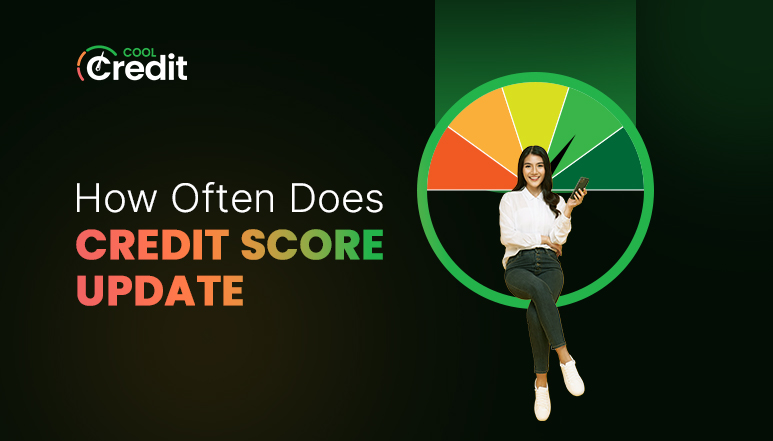
How Often Does Credit Score Update?
The world of credit may sometimes feel like deciphering a complex puzzle. Among the many questions that arise, one often overlooked yet crucial one is 'How often does credit score update?' Given that you undertake several financial transactions throughout the month, the frequency of updates becomes paramount in understanding your financial standing.
In this blog, we explore the factors influencing the frequency of your credit score updates and shed light on the steps you can take to increase it.
Explore 'What Credit Score Do You Start With' & Kickstart Your Credit Journey Today!
Get StartedWhen Do Credit Scores Update?
Every 30-40 Days. It's an Ongoing Process!
First and foremost, it is crucial to understand that your credit score isn't a static number. It's an indicator of your financial behavior that can fluctuate frequently throughout the month. These fluctuations are driven by various factors, including when creditors report information to the major credit bureaus: Experian, Equifax, and TransUnion.
Here's a breakdown of how often does credit score update:
1. Creditors and Credit Bureaus
The Duo at Work!
Creditors are not legally obligated to report your credit history to the nationwide credit reporting agencies. Instead, it's a voluntary practice. It allows creditors to decide when and how often they report to the credit bureaus. Consequently, some creditors may report to all three major bureaus—Experian, Equifax, and TransUnion—while others may not.
Additionally, credit card companies may refrain from reporting minor payment delays, such as being a day or two late on a payment. Furthermore, credit bureaus gather information from multiple sources beyond just creditors. It means that the information contained in your credit reports may differ depending on who is reporting it.
Creditors typically report to credit agencies on a monthly basis, though the specific reporting dates can vary between businesses. While some lenders and creditors submit information quarterly, larger companies often provide multiple monthly reports. Conversely, smaller companies may report only once a month, encompassing all of their customers in a single report.
This ongoing reporting process means that your credit report is regularly updated.
| A Fascinating Fact: The highest credit score that you can achieve is 850. |
2. How Does Having Multiple Financial Products Affect Your Credit Score Update?
The More the Products, the Greater the Responsibility!
Having multiple financial products can impact your score in several ways, but how often does credit score update depends on various factors. It includes the type of credit product and when lenders report to credit bureaus.
- Payment History
Making timely payments across multiple accounts can positively impact your credit score. However, missing payments or having late payments reported can lower your score. Payment history typically updates monthly, so any changes in this area will reflect your score accordingly.
- New Credit Inquiries
Applying for multiple credit products within a short period can result in several hard inquiries on your credit report, temporarily lowering your score. However, these inquiries typically have a minimal impact and diminish over time.
- Credit Utilization
If you have multiple credit cards or lines of credit, your credit utilization ratio may fluctuate more frequently. This ratio compares your total credit card balances to your total credit limits and can influence your credit score. Higher utilization can negatively impact your score, so it's essential to keep it low.
Monitoring your credit report regularly and practicing responsible credit management can help you maintain a healthy credit score regardless of the number of financial products you have.
Unlock Financial Future: Let AI Credit Repair Revolutionize Your Credit Score!
Learn HowHow To Check Your Credit Score?
Let's Brush up on the Basics!
Before delving into the timing of when your credit score updates, let's briefly review what it entails, how it's credit score is checked & calculated. Your credit score is a three-digit number ranging from 300 to 850 in most cases.
It's calculated based on information found in your credit report. It includes your credit history, payment history, credit utilization, length of credit history, and recent credit inquiries.
The most widely used credit scoring models are FICO® Scores and VantageScore®. While a credit score of 300 suggests a history of poor debt management and may cause creditors to hesitate before lending you money, a higher credit score generally means better financial opportunities. Scores higher than 700 signify responsible credit management and reliability in repaying debts.
Therefore, having a higher credit score translates to lower interest rates, fees, and deposits. Even a slight reduction in interest rates can thus save you thousands of dollars over the lifetime of a loan.
So, it is safe to say that it pays off to have a high credit score.
| Did you know? According to a study, approximately 71% of consumers who check their credit scores at least once a month feel they have control over their day-to-day finances. Conversely, a surprising 54% of adults never check their credit scores. |
Want Your Credit Score To Improve?
Bad Credit Scores Don't Last Forever!
Improving your credit score is not an overnight process. Even after indulging in responsible credit behavior, waiting for the credit scores to update can feel like watching a pot that never boils.
Having said that, you can gradually boost your creditworthiness by taking proactive steps and understanding the factors at play. Here's a lowdown on what you can do:
- Make Timely Payments
One of the most crucial steps to improving your credit score is to make all your payments on time. This includes credit card bills, loan payments, and utility bills. Timely payments demonstrate responsible financial behavior and can positively impact your credit score over time.
- Reduce Credit Card Balances
High credit card balances relative to your credit limits can negatively affect your credit score. Aim to keep your credit utilization ratio—the amount of credit you're using compared to your total available credit—below 30%. Paying down your balances can help improve your credit score.
- Check Your Credit Report
Regularly review your credit report to ensure that all the information is accurate. Look for any errors or discrepancies that could be dragging down your score. If you spot any inaccuracies, dispute them with the credit bureaus to have them corrected.
- Diversify Your Credit Mix
Having a mix of different types of credit accounts, such as credit cards, installment loans, and a mortgage, can positively impact your credit score. Lenders like to see that you can manage different types of credit responsibly.
How Can CoolCredit Help?
Your Go-to Credit Repair App!
CoolCredit is an innovative AI credit repair that provides a wide range of tools and Expert Assistance to help you improve your credit score. With CoolCredit, you can track your credit score, receive alerts about changes to your credit report, and access educational resources to better understand credit management. Additionally, its AI-generated dispute letter(s) empower you with the right tool to efficiently resolve the issues.
In conclusion, keeping track of how often does credit score updates empowers you with the knowledge to monitor your credit score and improve your financial standing. By staying aware of the frequency of updates and taking proactive steps to manage your credit responsibly, you can make informed decisions to enhance your creditworthiness and achieve your financial goals.







